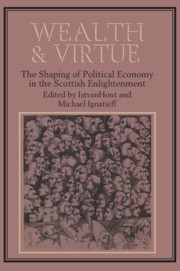Book contents
- Frontmatter
- Contents
- Preface
- List of abbreviations
- 1 Needs and justice in the Wealth of Nations: an introductory essay
- 2 Where had the Scottish economy got to by the third quarter of the eighteenth century?
- 3 Gershom Carmichael and the natural jurisprudence tradition in eighteenth-century Scotland
- 4 The Scottish professoriate and the polite academy, 1720–46
- 5 From applied theology to social analysis: the break between John Locke and the Scottish Enlightenment
- 6 The Scottish Enlightenment at the limits of the civic tradition
- 7 Adam Smith as civic moralist
- 8 The legal needs of a commercial society: the jurisprudence of Lord Kames
- 9 Cambridge paradigms and Scotch philosophers: a study of the relations between the civic humanist and the civil jurisprudential interpretation of eighteenth-century social thought
- 10 Adam Smith's ‘enduring particular result’: a political and cosmopolitan perspective
- 11 The ‘rich country–poor country’ debate in Scottish classical political economy
- 12 John Millar and individualism
- 13 Scottish echoes in eighteenth-century Italy
- Index
11 - The ‘rich country–poor country’ debate in Scottish classical political economy
Published online by Cambridge University Press: 05 June 2012
- Frontmatter
- Contents
- Preface
- List of abbreviations
- 1 Needs and justice in the Wealth of Nations: an introductory essay
- 2 Where had the Scottish economy got to by the third quarter of the eighteenth century?
- 3 Gershom Carmichael and the natural jurisprudence tradition in eighteenth-century Scotland
- 4 The Scottish professoriate and the polite academy, 1720–46
- 5 From applied theology to social analysis: the break between John Locke and the Scottish Enlightenment
- 6 The Scottish Enlightenment at the limits of the civic tradition
- 7 Adam Smith as civic moralist
- 8 The legal needs of a commercial society: the jurisprudence of Lord Kames
- 9 Cambridge paradigms and Scotch philosophers: a study of the relations between the civic humanist and the civil jurisprudential interpretation of eighteenth-century social thought
- 10 Adam Smith's ‘enduring particular result’: a political and cosmopolitan perspective
- 11 The ‘rich country–poor country’ debate in Scottish classical political economy
- 12 John Millar and individualism
- 13 Scottish echoes in eighteenth-century Italy
- Index
Summary
‘where the Necessaries of Life are cheap, there also will Labour and Art be cheap’
This is disputed
(Jonathan Swift's marginalia to John Browne's Essays on the Trade and Coin of Ireland, 1729)There would be no novelty in arguing that the eighteenth-century Scottish ‘inquiry into the origin and causes of the wealth of nations’ can a posteriori be seen as a series of considerations on why certain countries were rich and others were poor, whether the rich were getting richer while the poor were getting poorer or whether they were all marching together into some common future of ‘abundance’. The thesis of this paper is both more specific and more historical than that. It argues that there was a distinct debate in eighteenth-century Scottish political economy about the relationship of rich and poor countries as they coexisted and fought for international markets in historical time. While only the bare outlines of this debate can be presented here, these alone may serve to indicate how crucial this debate was to the shaping of classical political economy in the Scottish Enlightenment.
The terminal dates of this Scottish debate are 1752 and 1804. It was provoked by the publication in 1752 of David Hume's Political Discourses, and came to an end in the last major work of eighteenth-century Scottish political economy, Lord Lauderdale's Inquiry into the Nature and Origin of Public Wealth.
- Type
- Chapter
- Information
- Wealth and VirtueThe Shaping of Political Economy in the Scottish Enlightenment, pp. 271 - 316Publisher: Cambridge University PressPrint publication year: 1983
- 37
- Cited by

